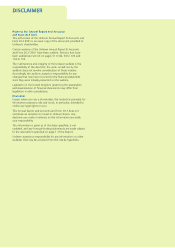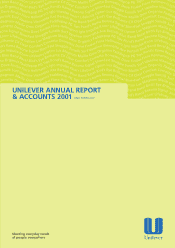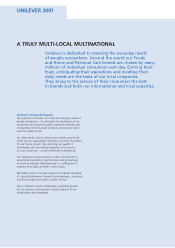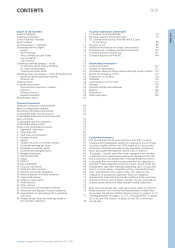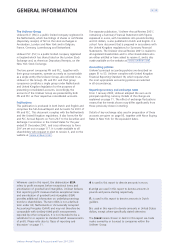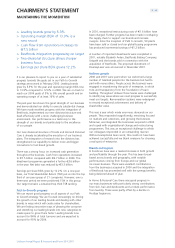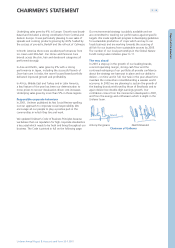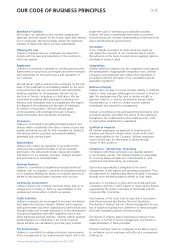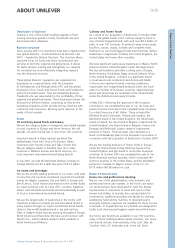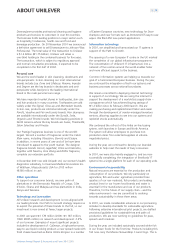Unilever 2001 Annual Report Download - page 11
Download and view the complete annual report
Please find page 11 of the 2001 Unilever annual report below. You can navigate through the pages in the report by either clicking on the pages listed below, or by using the keyword search tool below to find specific information within the annual report.
Unilever Annual Report & Accounts and Form 20-F 2001
ABOUT UNILEVER >8
DiverseyLever provides professional cleaning and hygiene
products and services to customers in over 60 countries.
The business holds leading positions in major sectors such
as hospitality, foodservice, health care and food and
beverage production. On 20 November 2001 we announced
a definitive agreement to sell DiverseyLever to Johnson Wax
Professional. The total value of the transaction to Unilever
is $1.6 billion (1.75 billion). Unilever will retain a
one-third holding in the combined business for five years.
The transaction, which is subject to regulatory approval
and normal consultative procedures, is expected to be
completed in the first half of 2002.
Personal care
We are the world leader in skin cleansing, deodorants and
anti-perspirants. In skin cleansing our most international
brands include Lux, Dove and Lifebuoy. Rexona, Impulse
and Degree are the key brands in deodorants and anti-
perspirants while Axe/Lynx is the leading international
brand in the male personal care range.
We have important market shares in toothpastes, skin care
and hair products in many countries. Toothpastes are sold
widely under the Signal, Close-up and Mentadent brands.
In skin care, products are sold internationally under the
Pond’s, Vaseline and Fair and Lovely brands. Hair shampoos
are available internationally under the Sunsilk, Seda,
Organics and Timotei brands. We hold leading positions in
North America where the key brands are Suave, ThermaSilk,
Salon Selectives and Finesse.
Our Prestige fragrances business is one of the world’s
largest. We sell a number of fragrances under the Calvin
Klein name, including Obsession, Eternity and Escape.
In addition, in recent years cK one and cK be have been
introduced to appeal to the youth market. The designer
fragrance brands Cerruti, Lagerfeld, Chloéand Valentino,
together with Nautica, Vera Wang and BCBG fragrance,
complete our extensive portfolio.
In December 2001 we sold Unipath Ltd, our women’s health
diagnostics subsidiary, to Inverness Medical Innovations Inc.
of Waltham, Massachusetts USA for £103 million
(166 million) in cash.
Other operations
To support our consumer brands, we own palm oil
plantations in the Democratic Republic of Congo, Côte
d’Ivoire, Ghana and Malaysia and tea plantations in India,
Kenya and Tanzania.
Technology and innovation
All Unilever research and development is now aligned with
our leading brands. Our Path to Growth strategy requires us
to exploit the potential of these brands to the full, so our
investment is now aimed at fewer, larger projects.
In 2001 we spent 1 178 million (2000: 1 187 million;
1999: 935 million) on research and development: 2.3%
of our turnover. Examples of recent significant projects
include the development of: Culinesse, a high-performance,
easy-to-use liquid cooking product; a new spread made with
fresh cheese launched as Rama Crême Bonjour in a number
of Eastern European countries; new technology for Dove
shampoo and new formats such as Domestos/Cif easy-to-use
wipes. We filed 450 new patent applications.
Information technology
In 2001, we simplified and harmonised our IT systems in
support of the Path to Growth.
The opening of a new European IT centre in the UK marked
the completion of our global infrastructure programme.
The concentration of Unilever’s IT infrastructure into a
network of five centres around the world enables faster
and more efficient support to the business.
Common information systems are helping us towards our
goal of a harmonised European business. During the year,
we continued the integration of both our systems and
business processes across national boundaries.
We remain committed to deploying internet technology
in support of our strategy. We are using the internet to
support the development of a world-class supply chain –
a programme which has achieved buying savings of
1.2 billion since its February 2000 launch. We are
making purchasing and replenishment faster and easier
through the development of vendor-managed inventory
services, allowing suppliers to see into our systems and
replenish stocks automatically.
We continued the roll-out of the Ariba on-line buying
system, with launches in Europe and North America.
The system will allow employees to purchase non-
production items from selected suppliers at volume-
negotiated prices.
During the year, we continued to develop our branded
websites to help meet the needs of busy consumers.
In 2001, we were also heavily engaged in, and are now
successfully completing, the integration of Bestfoods’ IT
systems into a single platform for each of our operating units.
Environmental responsibility
Natural resources are essential for the production and
consumption of our products. We rely particularly on
agriculture, fish and water: agriculture provides three
quarters of our raw materials, fish products are leading
product lines for our frozen food brands and water is
essential for the manufacture and use of our products.
Therefore, for the future of our supply chain – and the
wider environment – we are committed to working
towards sustainability in these three areas.
In 2001, we made considerable advances in our pioneering
initiative to develop standards for sustainable agriculture.
Following extensive international pilot projects, we drafted
provisional guidelines for sustainable tea and palm oil
production. We are now working on guidelines for peas,
spinach and tomatoes.
During the year, we included sustainably sourced white fish
in our frozen foods for the first time. Products including this
fish now carry the Marine Stewardship Council logo. This is

